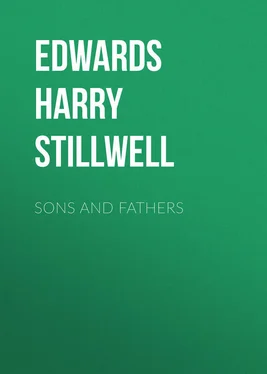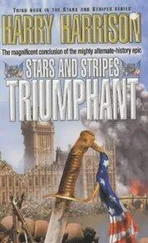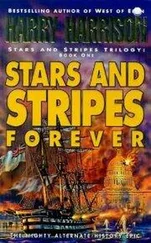Harry Edwards - Sons and Fathers
Здесь есть возможность читать онлайн «Harry Edwards - Sons and Fathers» — ознакомительный отрывок электронной книги совершенно бесплатно, а после прочтения отрывка купить полную версию. В некоторых случаях можно слушать аудио, скачать через торрент в формате fb2 и присутствует краткое содержание. Жанр: foreign_antique, foreign_prose, на английском языке. Описание произведения, (предисловие) а так же отзывы посетителей доступны на портале библиотеки ЛибКат.
- Название:Sons and Fathers
- Автор:
- Жанр:
- Год:неизвестен
- ISBN:нет данных
- Рейтинг книги:5 / 5. Голосов: 1
-
Избранное:Добавить в избранное
- Отзывы:
-
Ваша оценка:
- 100
- 1
- 2
- 3
- 4
- 5
Sons and Fathers: краткое содержание, описание и аннотация
Предлагаем к чтению аннотацию, описание, краткое содержание или предисловие (зависит от того, что написал сам автор книги «Sons and Fathers»). Если вы не нашли необходимую информацию о книге — напишите в комментариях, мы постараемся отыскать её.
Sons and Fathers — читать онлайн ознакомительный отрывок
Ниже представлен текст книги, разбитый по страницам. Система сохранения места последней прочитанной страницы, позволяет с удобством читать онлайн бесплатно книгу «Sons and Fathers», без необходимости каждый раз заново искать на чём Вы остановились. Поставьте закладку, и сможете в любой момент перейти на страницу, на которой закончили чтение.
Интервал:
Закладка:
"And sometimes chickens get the same way," she said, sagely, at which both laughed outright. Her face resumed its placid expression almost instantly. "It must be sad to be very poor; how I wish they could arrange for all of the poor people to come out here and find homes; there seems to be so much land wasted."
"They would not stay long anywhere away from the city," he said; "but do you never sigh for city life?"
"I prefer it," she replied, simply, "but we cannot afford it. And there is no one to take care of this place. It is harder on Annie, brother's wife. She simply detests the country. When I graduated – "
"You graduated!" he exclaimed, almost incredulously. She looked at him surprised.
"Yes, I am young, seventeen this month, but that is not extraordinary. Mamma graduated at the same age, sixteen, forty years ago." A servant approached, spoon in hand.
"Want some more lard, missy." She took her bunch of keys, and selecting one that looked like the bastile memento at Mount Vernon, unlocked the smoke-house door and waited. "Half of that will do, Gincy," she said, not looking around as she talked with Morgan, and the woman returned half.
"Now," she continued to him, "I must go see about the milking."
"I will go, too, if you do not object! This is all new and enjoyable." They came to where the women were at work. As they stood looking on, a calf came up and stood by the girl's side, letting her rub its sensitive ears. A little kid approached, too, and bleated.
"Aunt Mollie," Mary asked, "has its mother come up yet?"
"No, ma'am. Spec' somep'n done cotch her!"
"See if he will drink some cow's milk – give me the cup." She offered him a little, and the hungry animal drank eagerly. "Let him stay in the yard until he gets large enough to feed himself." Then turning to Morgan, laughing, she said: "I expect you are hungry, too; I wonder why papa does not come."
"Is he up?"
"Oh, yes; he goes about early in the morning – there he comes now!" The soldierly form of the old man was seen out among the pines. "Bring in breakfast, Gincy," she called, and presently several negroes sped across the yard, carrying smoking dishes into the cool basement dining-room. Then the bell rang.
At the top of the stairway Morgan had an opportunity to better see his hostess. The lady was slender and moved with deliberation. Her gray hair was brightened by eyes that seemed to swim with light and sympathy. The dress was a black silk, old in fashion and texture, but there was real lace at the throat and wrists, and a little lace headdress. She smiled upon the young man and gave him her plump hand as he offered to assist her.
"I hope you slept well," she said; "no ghosts! That part of the house you were in is said to be one hundred years old, and must be full of memories."
They stood for grace, and then Mary took her place behind the coffee pot and served the delicious beverage in thin cups of china. The meal consisted of broiled chicken, hot, light biscuits, bread of cornmeal, and eggs that Morgan thought delicious, corn cakes, bacon and fine butter. A little darky behind an enormous apron, but barefooted, stood by the coffee pot and with a great brush of the gorgeous peacock feathers kept the few flies off the tiny caster in the middle of the table, while his eyes followed the conversation around. Presently there was a clatter on the stairs and the little boy came down and climbed into his high chair. He was barefooted and evidently ready for breakfast, as he took a biscuit and bit it. The colonel looked severely at him.
"Put your biscuit down," he said, quietly but sternly, "and wait outside now until the others are through. You came in after grace and you have not said good-morning." The boy's countenance clouded and he began to pick at his knife handle; the grandmother said, gently:
"He'll not do it again, grandpa, and he is hungry, I know. Let him off this time." Grandpa assumed a very severe expression as he replied, promptly:
"Very well, madam; let him say grace and stay, under those circumstances." The company waited on him, he hesitated, swelled up as if about to cry and said, earnestly: "Gimme somep'n to eat, for the Lord's sake, amen." Grandma smiled benignly, but Mary and grandpa were convulsed. Then other footfalls were heard on the stairs outside, as if some one were coming down by placing the same foot in front each time. Presently in walked a blue-eyed, golden-haired, barefooted girl of three, who went straight to the colonel and held up her arms. He lifted her and pressed the little cheek to his.
"Ah," he said, "here comes the Duchess." He gave her a plate next to his, and taking her fork she ate demurely, from time to time watching Morgan.
"Papa ain't up yet," volunteered the boy. "He told mamma to throw his clothes in the creek as he wouldn't have any more use for them – ain' going to get up any more."
"Mamma, does your eye hurt you?" said Mary, seeing the white hand for the second time raised to her face.
"A little. The same old pain."
"Mamma," she explained to Morgan, "has lost the sight of one eye by neuralgia, tho you would never suspect it. She still suffers dreadfully at times from the same trouble."
Presently the elder lady excused herself, the daughter watching her anxiously as she slowly disappeared.
It was nearly noon when Norton Montjoy and Edward Morgan reached the law office of Ellison Eldridge. As they entered Morgan saw a clean-shaven man of frank, open expression. Norton spoke:
"Judge, this is Mr. Edward Morgan – you have corresponded with him." Morgan felt the sudden penetrating look of the lawyer. Montjoy was already saying au revoir and hastening out, waving off Edward's thanks as he went.
"Will see you later," he called back from the stairway, "and don't forget your promise to the old folks."
"You got my letter, Mr. Morgan? Please be seated."
"Yes; three days since, in New York, through Fuller & Fuller. You have, I believe, the will of the late John Morgan."
"A copy of it. The will is already probated." He went to his safe and returned with a document and a bunch of keys. "Shall I read it to you?"
"If you please."
The lawyer read, after the usual recitation that begins such documents, as follows: "Do create, name and declare Edward Morgan of the city of New York my lawful heir to all property, real and personal, of which I may die possessed. And I hereby name as executor of this my last will and testament, Ellison Eldridge of – state afore-said, relieving said Ellison Eldridge of bond as executor and giving him full power to wind up my estate, pay all debts and settle with the heir as named, without the order of or returns to any court, and for his services in this connection a lien of $10,000 in his favor is hereby created upon said estate, to be paid in full when the residue of property is transferred to the said Edward Morgan," etc.
"The property, aside from Ilexhurst, his late home," continued Judge Eldridge, "consists of $630,000 in government bonds. These I have in a safety-deposit company. I see the amount surprises you."
"Yes," said the young man; "I am surprised by the amount." He gave himself up to thought for a few moments.
"The keys," said Eldridge, "he gave me a few days before his death, stating that they were for you only, and that the desk in his room at home, which they fitted, contained no property."
"You knew Mr. Morgan well, I presume?" said the young man.
"Yes, and no. I have seen him frequently for a great many years, but no man knew him intimately. He was eccentric, but a fine lawyer and a very able man. One day he came in here to execute this will and left it with me. He referred to it again but once and that was when he came to bring your address and photograph."
"Was there – anything marked – or strange – in his life?"
Читать дальшеИнтервал:
Закладка:
Похожие книги на «Sons and Fathers»
Представляем Вашему вниманию похожие книги на «Sons and Fathers» списком для выбора. Мы отобрали схожую по названию и смыслу литературу в надежде предоставить читателям больше вариантов отыскать новые, интересные, ещё непрочитанные произведения.
Обсуждение, отзывы о книге «Sons and Fathers» и просто собственные мнения читателей. Оставьте ваши комментарии, напишите, что Вы думаете о произведении, его смысле или главных героях. Укажите что конкретно понравилось, а что нет, и почему Вы так считаете.












